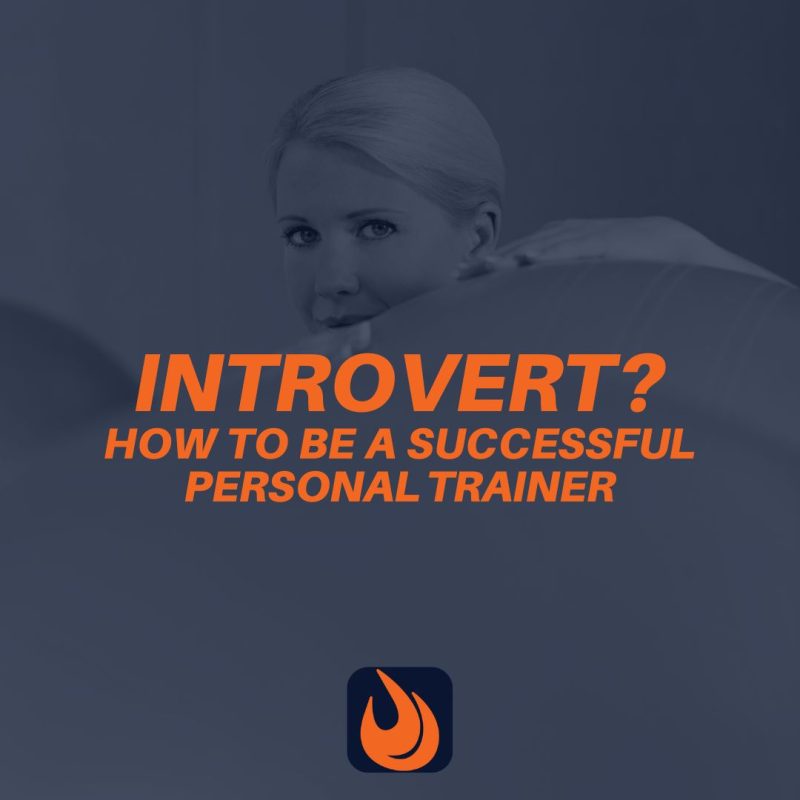
If you’re considering a career as a personal trainer but are worried your introversion might interfere with your success, the following will hopefully assuage your fears and increase your confidence moving forward as you pursue your path as a fitness professional. Read on to find out how introverts can embrace their natural inclinations and personality, even in a field working with many people a day.
What Introverts Are and Are Not
Being an introvert isn’t some disease or weakness. The term introvert doesn’t necessarily even mean shy.
It means being around a lot of people drains your energy and in order to recharge, that person needs to have some solitude to recharge. It’s really not about how quiet or loud or even outgoing a person is. Conversely, extroverts are fueled by others’ energy and love to be around people. They usually get restless if they have too much alone time.
Introverts can be sociable and enjoy the company of others, but perhaps prefer smaller crowds or for shorter periods of time; They tend to be content spending time alone. If are someone who gets tired after being around large groups and craves solitude, you likely introverted.
Like many constructs that appear to possess duality, there exists a continuum between introverts and extroverts; you may be 85% introverted and yet still have times when you can handle the energy of others more so than someone who is more like 95%. Introverts and extroverts have overlapping qualities; the key difference is where their energy comes from.
If you’re an extrovert, this blog may help you understand why some people really need downtime after being around large groups of people for a large amount of time. It doesn’t necessarily mean they need therapy or have anxiety disorders. They just need some solitude to recharge! Meanwhile if you are an introvert, don’t be judging extroverts as loud, outgoing gregarious, social party animals!
I wish I’d known this a long time ago. I tried living with roommates and didn’t realize why I just wanted to disappear for hours at a time or needed quiet. Also, I ran cross country in high school and after long races, I just wanted to be alone. Everyone else wanted to celebrate together as a team and would ask where’s Shay? Over there, in a corner. Over years of being an athlete, competing in various sports, and being a fit pro, I’ve been roasted for disappearing from the team. But, I always say, if you’re gonna dish it out, you better be able to take it, so I’d just find something to roast my teammates about, goodheartedly of course.
Fast forward year’s later and now there’s this abundance of data on introverts and details courtesy of Susan Cain’s book, Quiet: The Power of Introverts in a World That Can’t Stop Talking. If you’re interested in taking a deep dive into the world of introverts, I’d highly recommend this book. Or, if you’re interested in learning about your personality type, look into the Myers-Briggs Type Inventory (MBTI).
Ways Personal Trainers Can Handle Being Introverts
If you believe you’re an introvert, the following tools and techniques can aid in being successful as a fitness professional working with people:
1) Accept yourself as you are
Learn to embrace your introversion. It’s a personality trait that likely will not change. You don’t need to overcome it you need to honor your own needs and never beat yourself up for not being like your extroverted friends.
2) Take the space you need
If time and space are what you need find a way to ask for or take them so the influx of external energy doesn’t affect how you train your clients or impact a team. Schedule time between sessions rather than stacking back-to-back. This may make for a longer day, but that’s likely less exhausting for someone like you than training five people in a row without respite. (Building in a buffer before and after your shift is actually a good practice whether you are an extrovert or an introvert.)
3) Learn to leverage your strengths.
Typically, introverts are great listeners, planners, and strategists. This can be advantageous when you create your client’s training programs. If you sign a client for a long-term package, you can go to town with periodization and other strategies to maximize that client’s goals.
4) Partner with an extrovert! If you know there’s someone at your facility or in your community who is extroverted and displays their assets as such, see how you can partner together and help each other succeed. See #3 above; extroverts may have more showmanship, but planners they are not! Work together and create your own tour de force.
5) Train your tribe on your turf.
Birds of a feather flock together: Connect with clients who are introverts and train them! As fit pros, we attract the light that we shine. If you are an introverted leader, chances are, you will attract introverted clients. You can make that one of your niches or selling points.
Alternatively, use your knowledge of whether a client is an introvert or extrovert and tailor their sessions accordingly.
Since introverts operate optimally in familiar territory, consider having your own studio space however small rather than working in large gym environments that are constantly in flux.
5) Practice.
Practice training family members, friends, and other personal trainers. Join organizations such as Toastmasters or volunteer to speak at club sports (high school, middle school, community college, etc). You can also offer to give workshops at local businesses. In this way, you can practice your craft and become a subject matter expert while also practicing speaking in front of groups.
If you work for a corporate facility that provides community outreach and marketing, volunteer to go to events and work the booths. You can also talk to people in marketing and ask to shadow them for a portion of your workday.
By doing this, you can improve your skills on:
- Speaking in front of large groups.
- Get used to working with a team.
- Increase your confidence in teaching exercise mechanics
How Introverts Can Manage Their Personal Training Business
If you’re working at a large gym or any sort of open fitness floor:
Arrive early
If you work at a large facility or an open fitness floor model, chances are there will be other fit pros using the equipment and floor at the same time as you are. If you get there early, you can set up in the areas you are most comfortable in. Alternatively, if you want a challenge, then you can choose areas that you aren’t comfortable in and practice getting comfortable there before your day starts and your clients come in.
Prepare/create efficient systems.
If you have an efficient system on how to discuss packages with clients, work with the business closing/marketing team. Plan how you move clients through their sessions, so it takes less repetitive thinking. While you don’t want to become a robot, having an efficient system creates a streamlined process so you can be in action and have the head space to train clients rather than being distracted.
Find the quiet corners to recharge.
No matter what kind of facility you’re in, you can usually find a quiet corner to recharge. Even taking some quiet time when racking weights and setting up the next exercise for clients can be helpful.
Consider your business model:
1) Balance in-person training with Internet-based fitness business, Fitness vlog/blogging, becoming a Social Media Influencer, etc.
2) Scale your business: This doesn’t exactly always mean to obtain a larger facility or bring on other fit pro’s or staff. It could mean add more.
Mindset and Mindbody Solutions:
These tips can be helpful for all fit pro’s but research shows that introverts tend to need more:
1) Create a breathing or meditation practice.
If you have a practice you can do quickly and on the spot such as just counting your breaths or pausing to take one deep breath, it can help you stay focused in the moment. Alternatively, you can create a daily 5-10 minute practice that helps you stay focused all day with your clients.
2) Use affirmations and other Psychological Skills Techniques.
These are mindset-based techniques that will help you gain confidence.
3) Surround yourself with supportive people.
It makes no sense to spend time off with people who aren’t supportive. You support client goals all day long, so it only makes sense the people in your network do the same.
4) Check out really successful introverts and see how they did and use these as reminders that you can be successful.
The following is a list of successful introverted athletes and a book they’ve written:
Kobe Bryant The Mamba Mentality: How I Play
Michael Jordan: I Can’t Accept Not Trying
Tiger Woods: Tiger Woods
Larry Bird: Drive
Reggie Miller: I Love Being the Enemy
Take some of these steps, but don’t let introversion hold you back if you have the goal to be a successful personal trainer. You can help and inspire other introverted fit pros and clients. You can pair with an extrovert and both of you can learn from each other’s styles and strengths. Ultimately, be creative, be you! Introversion isn’t something to overcome or change. It’s something to recognize, honr, and leverage.
References
Quiet by Susan Cain
The Introvert’s Edge by Matthew Pollard
The Corporate Introvert by Steve Friedman
https://fit-pro.com/article-4550-Quietly-Making-a-Difference.html
http://teamleadershipreport.blogspot.com/2016/02/understanding-introverted-athlete.html







